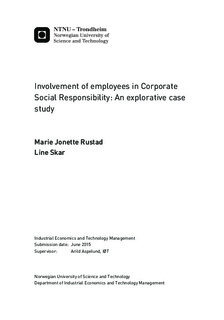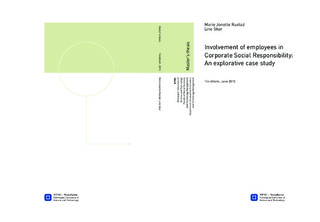| dc.description.abstract | Firms all over the world are increasingly challenged with how to cope with Corporate Social Responsibility (CSR), and CSR is more commonly becoming a decisive factor in processes to recruit, retain and motivate the most qualified employees. Research shows that firms can capture advantages with respect to the workforce when succeeding with engaging employees in their CSR program. Hence, it is interesting to explore how managers can optimally facilitate employee engagement in CSR. There has been limited research on how employees perceive their firm s CSR program, and as this is considered to be important for management to know in order to properly facilitate employee engagement in CSR, this will be given particularly attention in this study.
There are two research questions that are assessed in this study. The first is the main research question which involves how managers best can facilitate employee engagement in CSR, and the second is a corresponding sub-question that involves whether CSR can be used to motivate employees. These questions are answered through an explorative case study of two Norwegian case firms; one professional service firm and one facility service firm.
The first research question is answered by considering how the firms facilitate employee engagement in the work with CSR, in terms of how they manage their CSR strategy, what CSR activities they engage in, and how they communicate the CSR work internally in the organization. We have explored three different categories of CSR activities, namely corporate volunteerism, skill-based engagement and on-the-job engagement, and how employees perceive these activities. Through answering the first research question, we also hope to arrive at a conclusion to the sub-question, on whether CSR is a factor that motivates employees in terms of making them aim for more success at work.
The results show that managers can best facilitate employee engagement in CSR through on-the-job activities. Employees perceive the CSR program as more credible when the firm handles its own issues first, and managers must therefore prioritize on-the-job activities before external activities as corporate volunteerism and skill-based engagement. Managers must prioritize personal communication over written communication, as personal communication creates more awareness among the employees. Also, as it is crucial to know the employees perception of the firm s CSR involvement in order to succeed with implementing a CSR program that engages them, the employees perception must be continuously assessed so that the firm s CSR program is tailored after the needs and wants of the employees. This study further finds that CSR does not seem to motivate employees, but that it to some extent is contributing to job satisfaction and pride. | |

